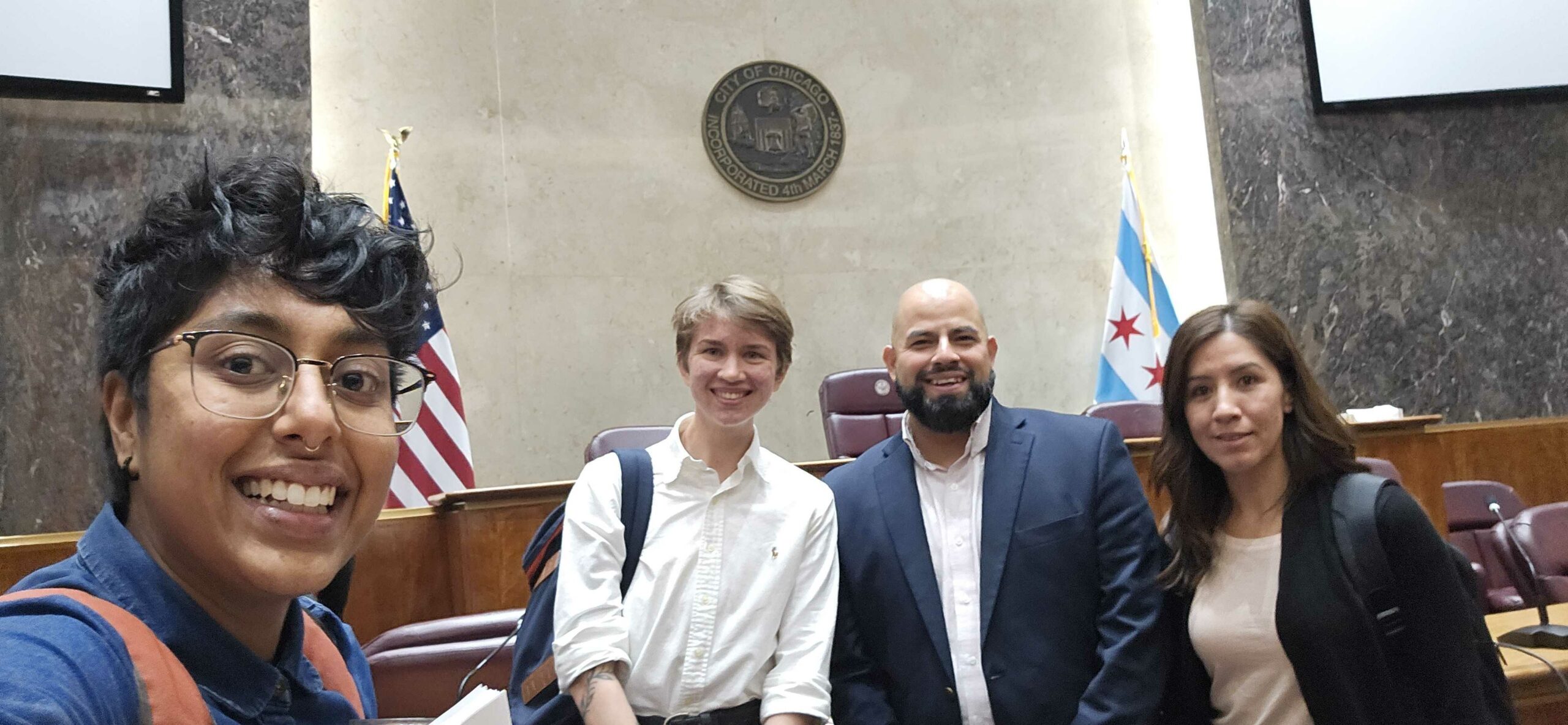
In May of 2023, Alderperson Vasquez was appointed as Chair of the Committee on Immigrant and Refugee Rights (CIRR), and what a year it has been!
When we began our work a year ago, Chair Vasquez and the CIRR team were keen to reenvision the role of the Committee following the lack of action and oversight by the former Committee leadership. CIRR is responsible for considering all legislation regarding the security and stability of immigrants and refugees in Chicago, with a focus on alleviating the economic, educational, and public-health challenges that immigrants and refugees face. We are proud to say that we have revitalized the Committee’s work, especially in the core areas of Oversight and Advocacy and Community Engagement.
While our work extends to all immigrants and refugees in Chicago, in the past year, we have focused particularly on new arrivals. Since August of 2022, Republican governors and other government officials have been forcibly migrating asylum seekers to the Chicagoland area, creating chaos. As we entered this role, the new administration had just begun formulating the New Arrivals Mission: a collective effort of government officials, community organizations, and mutual aid groups to address forced and voluntary migration and support new arrivals who came to our city seeking help.
In the past year, The Committee’s work has been focused on understanding the operations and gaps of the New Arrivals Mission, and uplifting the needs of new arrivals and those supporting them. In the coming year, we plan to continue this work, while spending more time understanding and developing solutions to address issues facing all immigrants and refugees in Chicago––both those who just arrived, and long-term residents.
Oversight and Advocacy
Public Meetings
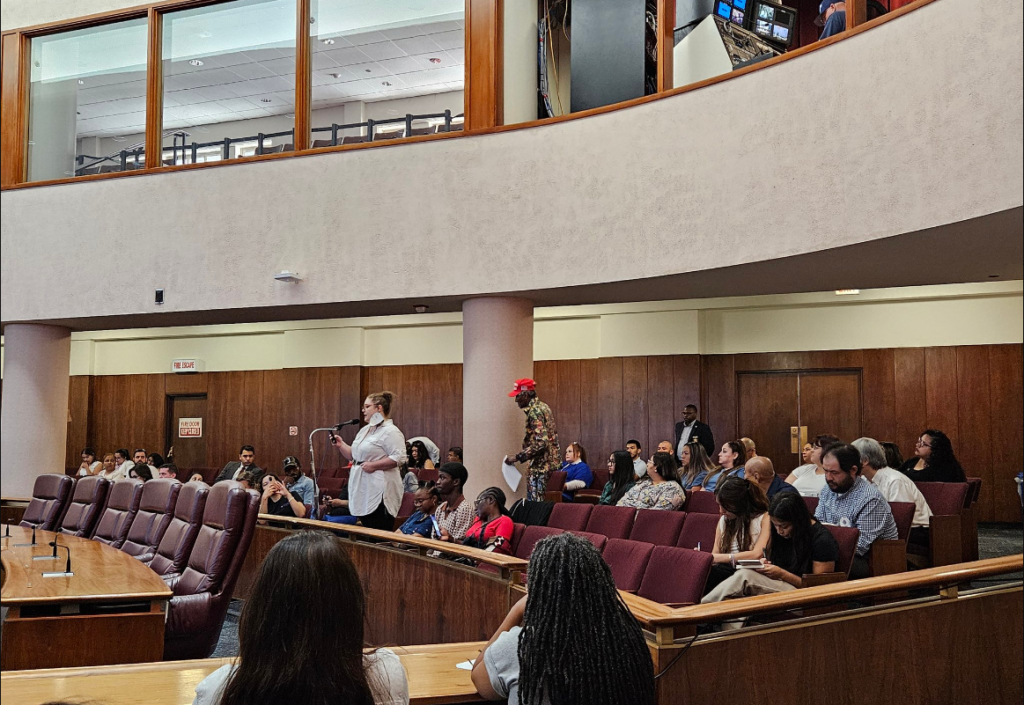
One of our first priorities was to bring increased transparency to the Committee’s work. The prior iteration of the Committee held only five public meetings in 4 years. In only the past year, our Committee has held 8 public meetings to discuss important issues facing immigrants and refugees, and to facilitate public transparency with regard to the City’s operations.
Take a look below at some of what we’ve discussed and accomplished in our meetings this past year:
- June 28th, 2023: Our first act as a Committee was to call for monthly hearing(s) regarding city response to migrant crisis, to ensure public transparency and communication on the New Arrivals Mission.
- July 26th, 2023: We collected testimony and discussed the roles of the Department of Family & Support Services (DFSS); Chicago Public Schools (CPS); the Office of Emergency Management & Communications (OEMC); and the Chicago Department of Public Health (CDPH) in welcoming new arrivals.
- September 29th, 2023: We discussed the roles , time, and money spent by the Office of the Mayor, the Office of Emergency Management and Communications (OEMC), The Chicago Police Department (CPD), and mutual aid groups (including Police Station Response Teams and Migrant Mobile Healthcare Teams) in welcoming new arrivals to Chicago.
- December 7th, 2023: We called on the federal government to issue work permits to both new migrants and long-term contributing immigrant workers. We also discussed African migration and the Black diaspora, including Haitian migration. Lastly, we discussed the history of the Welcoming City Ordinance as well as the meaning of being a “welcoming city in a welcoming state” with the United African Organization; The Coalition of Haitian American Organizations in the Chicagoland Area; the Illinois Coalition for Immigrant and Refugee Rights; and the National Immigrant Justice Center.
- January 30th, 2024: In response to reports of alarming shelter conditions that the Committee had heard from mutual aid groups and new arrivals, we held a hearing to discuss the conditions of landing zones and city-run shelters, as well as the procedure for reporting shelter grievances, and the oversight of agencies contracted to work within new arrival shelters. The Office of the Mayor, the DFSS, and the OEMC provided testimony.
- March 28th, 2024: we passed legislation directing the DFSS to provide City Council daily reports of the total New Arrivals and Asylum Seekers evicted or removed from city-run emergency temporary shelters.
- July 2nd, 2024: We called for hearing(s) with the CPD and the Chicago Law Department regarding the status of U Nonimmigrant Status certifications and policies for approval/denial, as well as their data collection process. We also called for U.S. President Biden and Secretary of Homeland Security to process requests for temporary protective status to Ecuadorian citizens migrating to the United States. Lastly, we called for hearing(s) to explore and address implications of climate change-induced migration to Chicago.
- July 23rd, 2024: We held a hearing regarding the city’s ongoing shelter evictions, and discussed an amendment to prohibiting length of stay limitations (otherwise known as the 60-day shelter limit) for city-run transitional shelters.
We are so grateful for those who supported us as panelists and subject matter experts in these hearings: new arrivals, police station response team leads, the Mobile Migrant Health Team, the United African Organization, the Coalition of Haitian American Organizations in the Chicagoland Area, the Illinois Coalition for Immigrant and Refugee Rights, the National Immigrant Justice Center, Urban Institute, Enterprise Community Partners, Alianza Americas and UIC. Thank you also to all of the community members who provided public comment!
Data and Analysis on City Operations
Municipal programs, processes, and budgets are inaccessible to the general public, because of their complexity and the lack of transparent communication. As a Committee, one of our first priorities is to make the knowledge that we accumulate available and transparent to advocates, immigrant and refugee communities, and constituents. While the Committee does not have authority over the City’s operations regarding new arrivals, our goal is to provide transparency to the public about the City’s response to new arrivals.
Here are some of the ways we’ve done that in the past year:
- Resources: There are so many organizations that provide a variety of services to the immigrant and refugee community, but especially as a new immigrant or refugee, it can be difficult to navigate how to find these services. To make it easier for communities to access this information, we compiled a central database of these resources.
- Data: Absent of municipal code-required reporting, it takes a lot of internal advocacy to request data on government processes. After hearing from alders the need for better data tracking, we successfully secured weekly reporting from the Mayor’s Office. This data helped paint the picture of the New Arrivals Mission. We built out a dashboard to track this data, which is now used widely by both reporters and advocates. We also introduced and successfully passed an ordinance to track those evicted from shelters.
- Process: There is a constellation of city, state, and federal departments, as well as contracted service providers, who provide a variety of programs for immigrants and refugees. Unfortunately, these programs and how to access them are not always clearly communicated to the public. The Committee created a database of those programs to communicate the scope of the mission to the public. We plan to continue expanding this database in the upcoming year.
Policy Solutions
Following community engagement, internal research and operational analysis, and conversations with advocacy groups, Chair Vasquez has introduced and co-sponsored many pieces of legislation that seek to examine and improve the conditions of immigrant and refugee communities in Chicago.
Here are a few highlights of what we’re working on:
- Expanding language access
- Understanding climate-induced migration
- Mandating shelter eviction reporting
- Curbing shelter evictions
- Understanding barriers to securing housing.
We hope to provide the full list on our website soon but in the meantime, feel free to stay updated on these various policies via the City’s legislation database!
Community Engagement
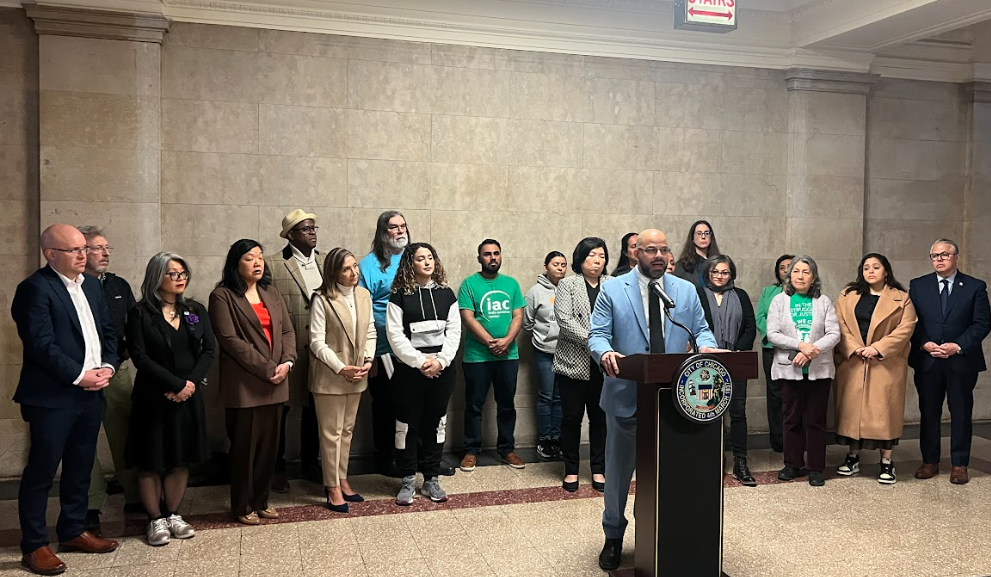
One of the Committee’s goals is to deepening relationships with the communities that fall under its jurisdiction. Successful government service delivery doesn’t occur without meeting the community where they are. To develop future programs and policies that work, they be founded in a deep understanding of the community’s needs, which requires consistent and ongoing community input. It also requires transparency in sharing government resources and information with those who would most benefit from that knowledge.
Here are some of the ways we’ve engaged with the immigrant and refugee community in the past year:
Mutual Aid and Volunteering
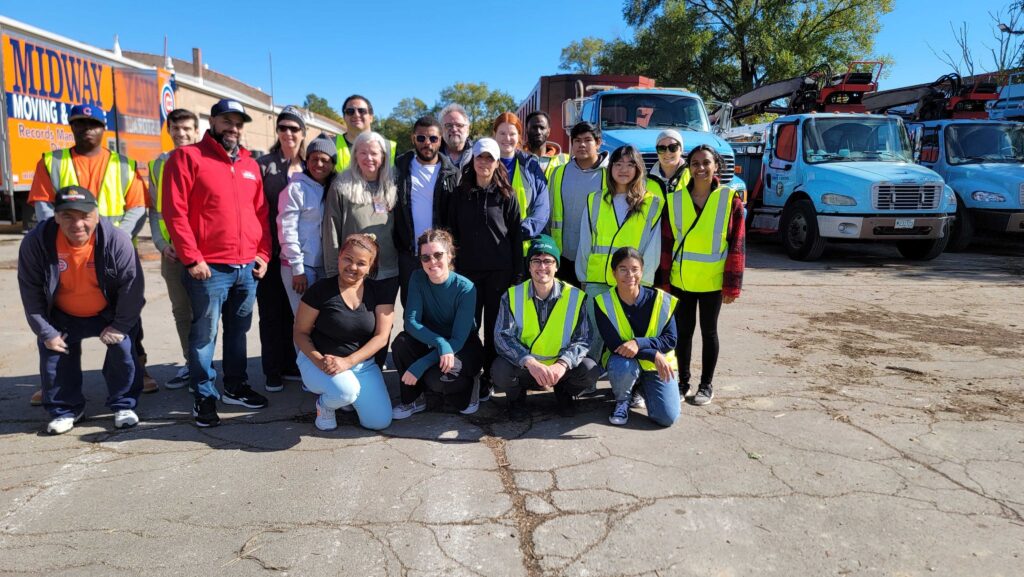
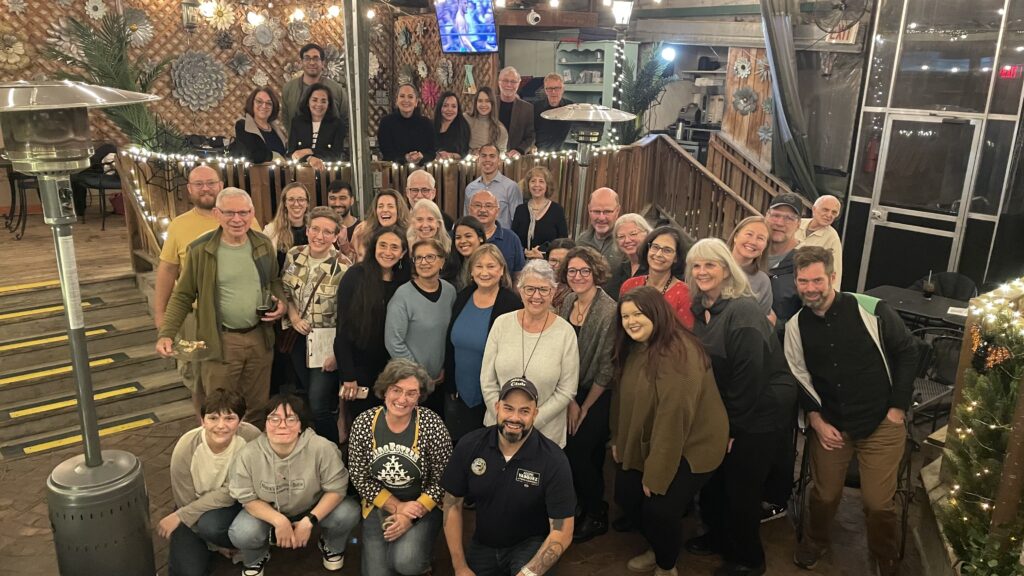
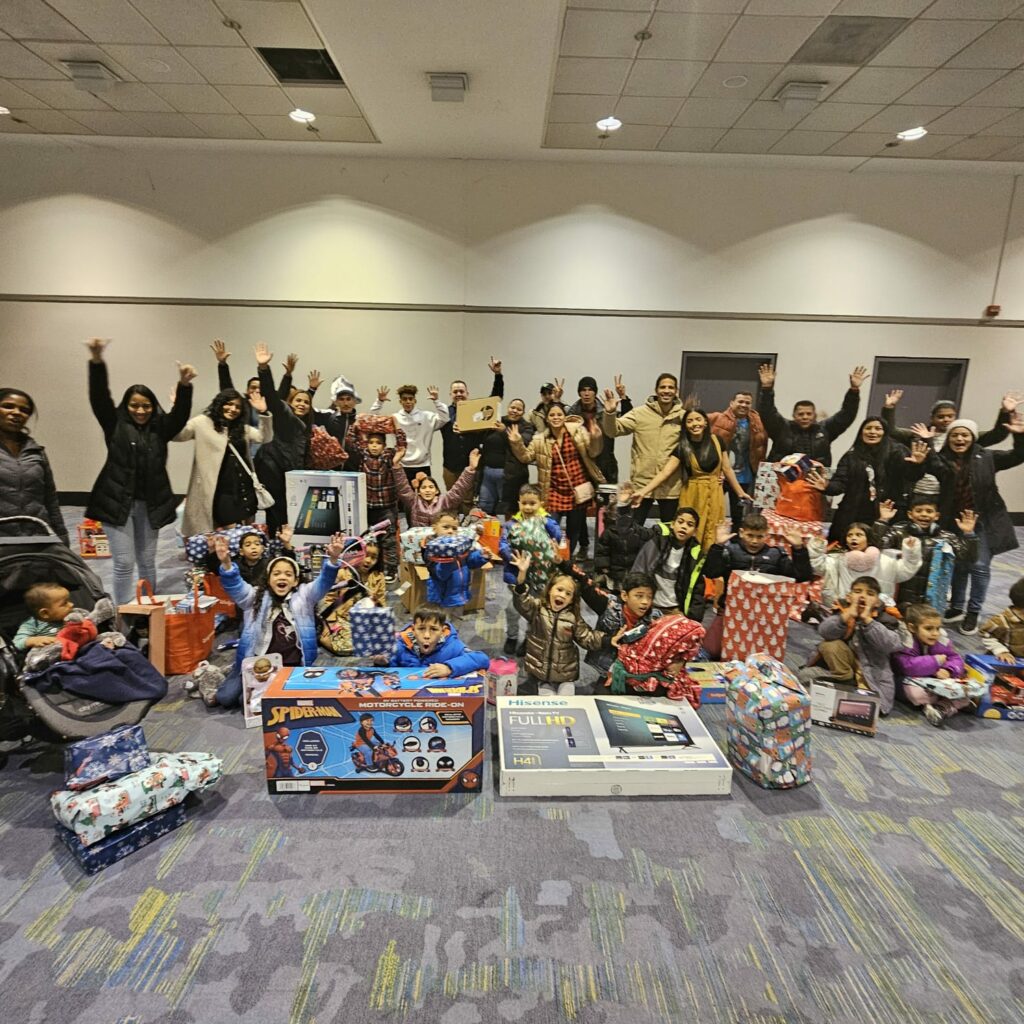
In the beginning stages of the humanitarian crisis created by forced migration, the 40th Ward––and later, the Committee––were deeply involved in the citywide effort to address it. These efforts were led by good-hearted neighbors who saw the government’s inability to move quickly to meet the moment, and stepped up to provide basic needs to new arrivals.
In the first months of the crisis, we acted as a donation drop-off site, prepared food to drop off at police stations to ensure new arrivals were being fed, secured donations from neighbors, restaurants, and retailers, and organized the logistics of supporting new arrivals. We particularly want to shout out every neighbor in the 40th Ward who volunteered with the 20th District Police Station Response team––we will never forget your generosity and fighting spirit in those chaotic times!
Workshops and Clinics
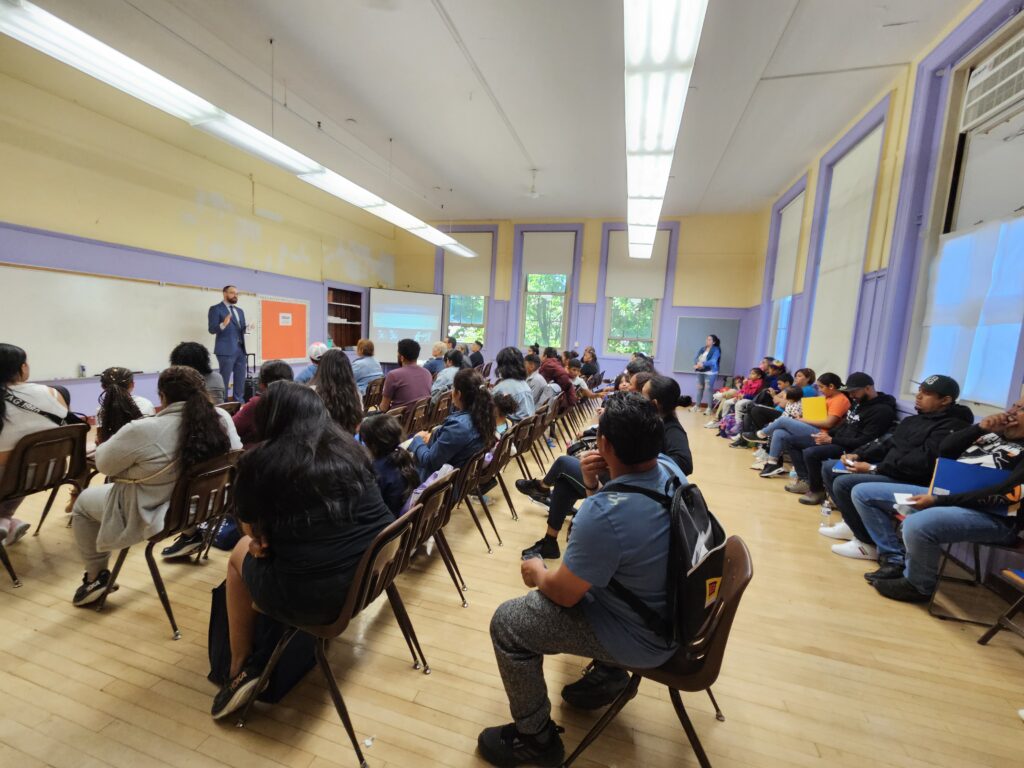
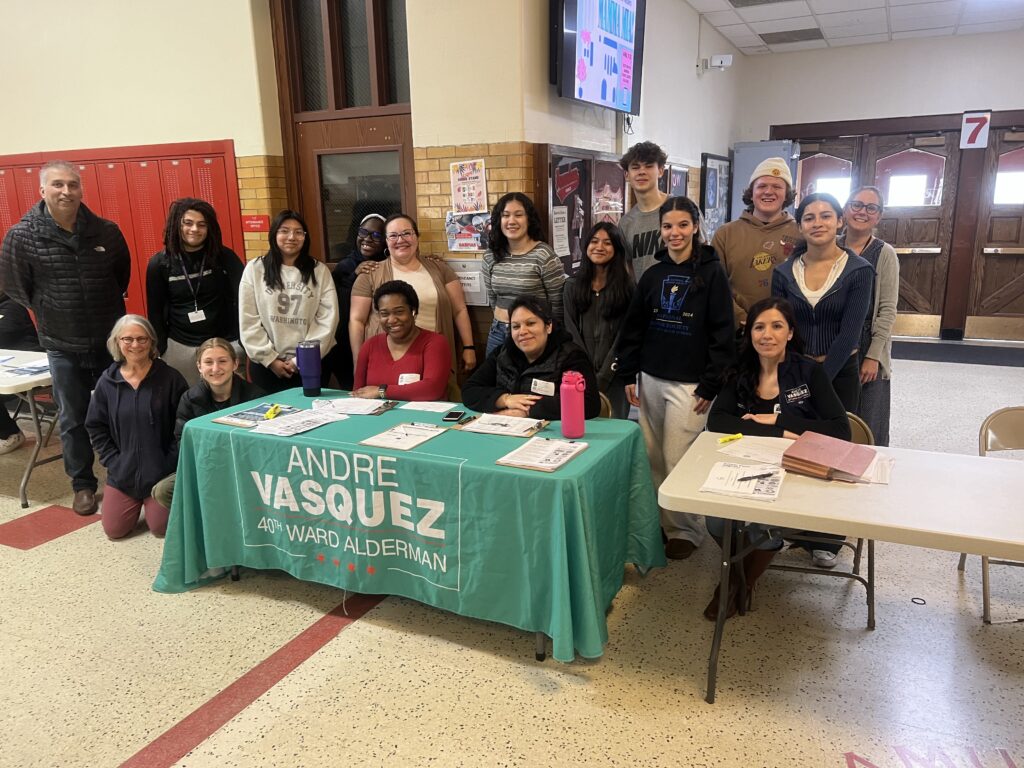
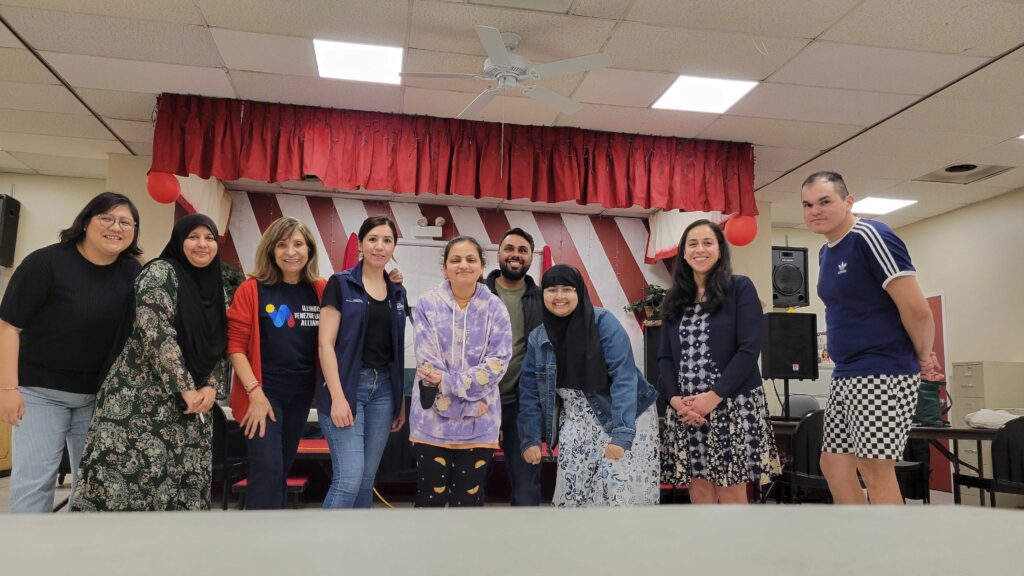
We also established a series of workshops and clinics to ensure that new arrivals continue to receive support, even after the decompression of police stations last year. Here are some of the ways we’re supporting them:
- Know Your Rights Workshops: CIRR has hosted 7 Know Your Rights workshops to date across Chicago to educate educate immigrant and refugee communities who come from other parts of the world and have different cultural and legal contexts. These workshops were led in-language in both Haitian and Spanish. We deeply appreciate the partnership of the local community-based organizations who helped us serve 300+ Chicagoans in understanding their rights and responsibilities as Chicago residents and in connecting them to organizations and government services that they may not have been able to access otherwise.
- City Key: While originally created to reduce barriers to those who have difficulty accessing government-issued identification, the City Key Program’s goals have since grown to include discounts and other benefits for all of Chicago’s residents, including immigrants and refugees. The Committee has hosted four City Key events in partnership with the City Clerk’s Office and local community based organizations. We have so far assisted 650+ Chicagoans in securing government identification, and look forward to serving more in the future.
- Legal Clinics: One of the biggest needs of an immigrant or refugee is in applying to change their legal status in this country. The federal government dictates a person’s legal condition in the context of immigration law, and the process of applying for one of the many statuses and navigating the legal system is challenging. The Committee has assisted in holding clinics for those applying for Temporary Protected Status and Employment Authorization Document, and those who wish to change the date and location of their immigration court case.
As you can see, it’s been a big year, and we look forward to continuing our work in the years to come! Lastly, we want to give a huge thank you to all of our partners and volunteers in the last year who made our events successful:
Cook County Public Defender’s Office, Illinois State Comptroller’s Office, Illinois Secretary of State’s Office, 25th Ward, 34th Ward, UIC International Human Rights Clinic, Family Focus, Chinese Mutual Aid Association, Haitian American Museum of Chicago, Illinois Workers in Action, Immigration Attorney Rocio Velazquez Kato, Attorney Alejandra Palacios, Panas en Chicago, Illinois Venezuelan Alliance, Nuevos Vecinos, ScaleLIT, KaarPoh, NAMI Chicago, XILIN, Latino Treatment Center, Pilsen/Little Village Parent University, Talcott Elementary School, Jamieson Elementary School, Amundsen High School, Erie Neighborhood House, UIC Mobile Migrant Health Team, Pilsen Food Pantry, The Resurrection Project, Enlace, Alivio Medical Center. 20th District Mutual Aid, Harvestime Foods, Rainbow Tacos, Misericordia Bakery, Isabella’s Bakery, Taco Boom, Half Acre Beer Company, Bryanna’s Restaurant, Old National Bank, Zam Zam Foundation, Indo American Center
Want to stay updated on CIRR’s work? Sign up for our newsletter or follow us on Facebook and Twitter to keep in touch!
Cheers to another year,
The Chicago Committee on Immigrant and Refugee Rights